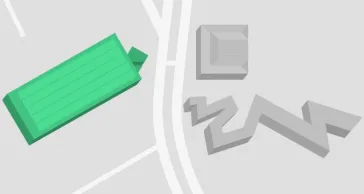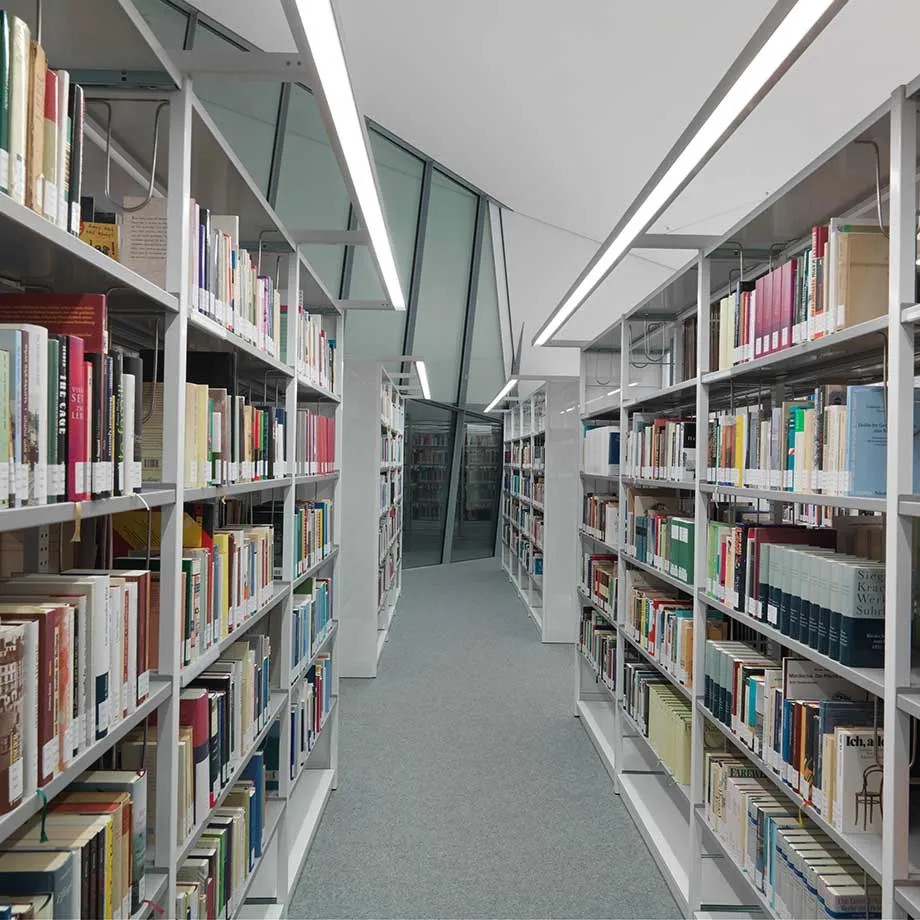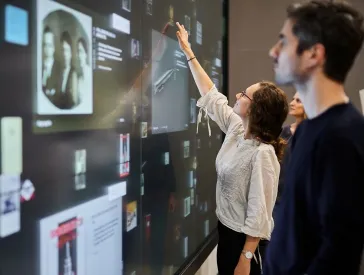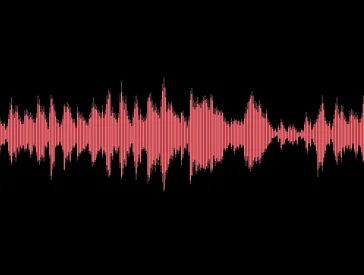Classification Scheme of the Library of the Jewish Museum Berlin
Here you can find the classification scheme of our library from the following classification groups: reference works, arts, history, biographies, languages, Israel/Palestine, religion/philosophy, literature, performing arts, migration and diversity, and other fields of knowledge.

Where
W. M. Blumenthal Academy, Library
Fromet-und-Moses-Mendelssohn-Platz 1, 10969 Berlin
Postal address: Lindenstraße 9-14, 10969 Berlin
I. Reference Works
I. 1. Encyclopedias
I. 1.1. Specialized Reference Works
I. 2. Bibliographical Reference Works
I. 3. Biographical Reference Works
I. 4. Address Books
I. 5. Dictionaries
I. 7. Source Studies
I. 8. Maps
I. 9. Publications, Exhibition Catalogues of the Jewish Museum Berlin
II. Arts
II.0. Reference Works, Encyclopedias
II.1. Art History
II.1.0. General Reference Works, Catalogues, Dictionaries
II.1.1. Art Theory, Visual Culture
II.1.2. Artist’s profession (education, art academies)
II.1.3. Art Trade (Galleries, Collectors, Patrons)
II.1.4. Art Looting (Expropriation, Looted Art, Restitution)
II.1.5. Art Reception
II.2. Iconography (Motifs, Symbols and Themes)
II.2.0. General Reference Works, Catalogues
II.2.1. Bible, Religion
II.2.2. Zionism
II.2.3. Humans, Society, Everyday Life
II.2.4. Anti-Jewish Depictions
II.2.5. Shoah, Holocaust
II.2.20. Miscellaneous
II.3. Fine Arts (Painting, Graphics, Sculpture)
II.3.0. General Reference works, Catalogues
II.3.1. Antiquity (ca. 1500 BCE – ca. 600 AC)
II.3.2. Middle Ages (600–1500)
II.3.3. Modern Period (1500–1900)
II.3.4. Classical Modernity (1900–1945)
II.3.5. Art in Concentration Camps, in the Resistance, in Exile (1933–1945)
II.3.6. Post-war Period (1945–1990)
II.3.7. Present Age (since 1990)
II.4. Applied Arts
II.4.0. General Reference Works, Catalogues
II.4.1. Caricature, Comic
II.4.2. Books, Printed Works, Paper (Design, Illustration, Typography)
II.4.3. Gold- and Silver-Smithery
II.4.4. Metalwork (Copper, Sheet Metal, Bronze, Iron, Tin Casting)
II.4.5. Porcelain, Ceramics, Glass, Enamel
II.4.6. Textiles (Carpets, Weaving, Needlework)
II.4.7. Interior Design, Furniture, Home Appliances
II.4.8. Fashion, Costumes, Jewelry
II.4.9. Poster Design, Advertising
II.4.20. Artists
II.5. Judaica
II.5.0. General Reference works, Catalogues
II.5.1. Book Art, Manuscripts (Design, Illustration, Typography)
II.5.2. Textiles
II.5.3. Metalwork
II.6. Architecture
II.6.0. General Reference Works, Catalogues
II.6.1. Memorials
II.6.2. Miscellaneous Themes
II.6.20. Architects
II.7. Photography
II.7.0. General Reference Works, Catalogues
II.7.1. Miscellaneous themes and motifs
II.7.20. Photographers
II.8. Catalogues (Collections, Exhibitions)
II.8.1. Jewish Museums (Jewish Museum Berlin see I.9)
II.8.2. Other Museums and Institutions
II.9. Synagogues, Mikvehs
II.9.0. General Reference Works, Catalogues
II.9.1. Synagogues in Germany
II.9.2. Synagogues worldwide
II.9.3. Mikvehs
II.10. Cemeteries, Sepulchral Art
II.10.0. General Reference Works, Catalogues
II.10.1. Cemeteries, Sepulchral Art in Germany
II.10.2. Cemeteries, Sepulchral Art worldwide
II.11. Auction Catalogues
II.12. Artists
III. History
III. 1. History in General
III. 2. German History
III. 3. Berlin History
III. 5. Jewish History of Berlin
III. 5.1. Jewish History of Berlin in General
III. 5.2. Communities, Museums, Schools, Hospitals
III. 5.3. Companies and Institutions
III. 5.4. Borough History
III. 6. Jewish History in Germany
III. 6.1. Jewish History in Germany in General
III. 6.2. Middle Ages, Early Modern Period
III. 6.3. Absolutism
III. 6.4. Emancipation (1780–1871)
III. 6.5. German Empire, Weimar Republic
III. 6.6. see III.9.2. 1933–1945
III. 6.7. Postwar Period, Federal Republic of Germany, GDR
III. 6.8. Economic History
III. 6.9. Present age (1990–present)
III. 7. Regional and Local History
III. 8. Jewish History
III. 8.1. Jewish History in General
III. 8.2. Anti-Semitism, Defense
III. 8.3. Jewish History of Europe
III. 8.4. Jewish History of Non-European Countries
III. 9. National Socialism
III. 9.1. Nazi Sources
III. 9.2. History of the Jews 1933–1945
III. 9.3. Exile, Emigration
III. 9.4. Resistance
III. 9.5. Secondary Literature
III. 10. Examination of Nazi-Period
III. 10.1. War Crime Trials, "Wiedergutmachung"
III. 10.2. Culture of Remembrance, "Vergangenheitsbewältigung"
III. 10.3. Memorials
IV. Biographies, Autobiographies, Letters, Diaries
IV. 1. Biographical Anthologies
V. Languages
V. 1. Hebrew
V. 2. Yiddish
VI. Israel, Palestine
VI. 1. Antiquities, Palestine
VI. 2. Zionism
VI. 3. State of Israel
VI. 4. Arab countries, Palestine, Wars
VII. Religion, Philosophy
VII. 1. Bible, Reference Works on the Bible, Early Literature
VII. 2. Prayer books
VII. 3. Talmud
VII. 4. Haggadot, Late Literature
VII. 5. Philosophy, Religion, "Wissenschaft des Judentums"
VII. 6. Sermons
VII. 7. Christianity
VII. 8. Islam
VII. 9. Religious Studies
VIII. Literature
VIII. 1. Authors
VIII. 2. Anthologies
VIII. 3. Literary Science
VIII. 4. Bibliophilia
VIII. 5. Journalism
VIII. 6. Children’s and Youth Literature
VIII. 7. Satire, Humor
IX. Performing Arts
IX. 1. Music
IX. 2. Theater
IX. 3. Film
IX. 4. Dance
X. Miscellaneous Fields of Knowledge
X. 1. Sports
X. 2. Everyday Culture
X. 3. Cooking
X. 4. Living
X. 5. Medicine
X. 6. Miscellaneous
X. 7. Calendars
X. 8. Natural Science
X. 9. Education
X. 10. Sociology
XI. Rare Periodicals
XII. Current Periodicals
XIII. Collections
XIV. Museology
XV. Migration and Diversity
XV. 1. History
XV. 2. Politics and Law
XV. 3. Religion
XV. 4. Minority Groups
XV. 5. Autobiographies, Biographies
XV. 6. Education
XV. 7. Media
XV. 8. Literature, Arts, Culture
XV. 9. Racism and Discrimination
XV. 10. Theory

The Library of the Jewish Museum Berlin
- Our Library: Books, films, and more about Jewish art, culture, and history
- Library Catalog (OPAC)
- Our Collections: collection fields at a glance
Information for Visitors
- Reading Room: Opening hours, catalogs, databases, requesting archive material
- Registration Form: Register to view rare holdings from our library and documents from our archive
- Terms of Use: Requirements for visitors to the archive and library of the Jewish Museum Berlin
- Current page: Our Library’s Classification Scheme: The focuses and thematic areas according to which our collection is organized and grouped
- List of Fees: Prices and rates for services at the reading room of our library and archive
Collections and Projects
- Collections on Jewish Art and Culture: Volumes printed by the Soncino Society, the publications of the Centralverein, Hebrew Printing, and special collections on Jewish art and visual culture
- The Artur Brauner Collection: Twenty-one films by the successful film producer
- Digitizing Book Holdings: Publications of the Soncino Society of Friends of the Jewish Book, 2016
- Enlarging and Indexing Our Holdings in Jewish Art: DFG Project on visual and material culture of Judaism, 2013–2018
Digital Content
- Highlights from the Library Collection: A medieval manuscript, a cookbook from 1900, an elaborate Hebrew children’s book and other treasures
- Digital Books: A complete list of our digitized books, in German
- Rare Digital Books: Curated selection of valuable digitized material from our holdings
- Story Time in Our Library: Why Noah Chose the Dove by Isaac Bashevis Singer, 2023
- “Hörmahl:” A Feast for the Ears: Podcast series about Rahel Varnhagen, Lina Morgenstern and other women writers, 2021–2022, in German
See also
- Judaica Portal: Online database of Judaica holdings at various institutions, including our library’s holdings
- Periodicals in the ZDB: Research tool for magazines, newspapers, and databases in German and Austrian libraries
- Deutsche Digitale Bibliothek (DDB): Our digitized publications accessible via the DDB
- AG Jüdische Sammlungen: Website of the Jewish Collections working group, in German
- Library Holdings: Search engine for our online collections, in German
- Literature
- Literature for Children and Young Adults
- Digital Archive of Jewish Authors in Berlin 1933–1945: cooperation (in German)

